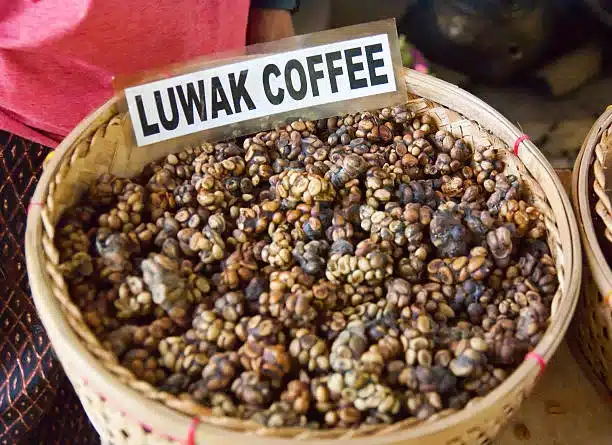An Introduction to Kopi Luwak Coffee
In the diverse and intricate world of coffee, there lies a brew so unique and so shrouded in both allure and controversy that it has become the stuff of legends. Welcome to the realm of Kopi Luwak Coffee, often hailed as the world’s most exclusive—and perhaps most debated—coffee. But what exactly makes Kopi Luwak stand apart in an industry brimming with specialty and artisanal blends? It’s not just about the taste, nor is it solely about the rarity. The real twist lies in its bizarre journey from bean to cup—a process so unconventional that it might just redefine your understanding of luxury coffee.
Kopi Luwak originates from the lush, tropical forests of Indonesia, a land synonymous with rich coffee traditions. Here, amidst the dense canopies and vibrant wildlife, the key to this coffee’s unique character roams freely. But before we dive into the exotic process that gifts Kopi Luwak its distinct flavor profile, let’s take a moment to savor the anticipation. Imagine a coffee so intriguing that its story is as compelling as its taste. A bean that journeys through the natural world in a way no other coffee does, undergoing a transformation that’s as natural as it is astonishing.
Stay with us as we embark on this journey to uncover the secret behind Kopi Luwak, the coffee that challenges conventions and tantalizes the taste buds of connoisseurs and curious sippers alike. It’s a story of nature, luxury, and a little touch of the wild side of coffee production. Prepare to be intrigued, maybe a bit surprised, and definitely captivated by the world’s most exclusive coffee.

What is Kopi Luwak Coffee?
The Basics
Definition of Kopi Luwak, also known as civet coffee, is not just a coffee but an experience. At its core, Kopi Luwak coffee is made from coffee beans that have been eaten, digested, and then excreted by a small mammal known as the Asian palm civet (Paradoxurus hermaphroditus). This unique process is not a modern gimmick but a natural occurrence. The civets, being selective feeders, pick only the ripest and finest coffee cherries. The beans, while passing through the civet’s digestive tract, undergo a fermentation process where enzymes break down proteins that give coffee its bitter taste. The end results? Beans that are less acidic, smoother, and with a rich, distinctive flavor profile that has intrigued coffee enthusiasts worldwide.
Its Place of Origin and Historical Background The roots of Kopi Luwak coffee trace back to the coffee plantations in Indonesia during the Dutch colonial era. Back then, local farmers and plantation workers were prohibited from harvesting coffee for their own use. Resourcefully, they discovered that the wild civets were consuming the ripe coffee cherries and leaving the beans undigested in their droppings. The locals collected these beans, cleaned them, and brewed their coffee. To their surprise, the coffee was exceptionally smooth and aromatic. This discovery marked the beginning of Kopi Luwak’s journey as a sought-after delicacy.
Over time, the allure of Kopi Luwak spread beyond Indonesia, capturing the curiosity of coffee aficionados globally. Its rarity and unique production process have cemented its status as one of the most expensive and exclusive coffees in the world. Kopi Luwak coffee is not just about enjoying a cup of coffee; it’s about experiencing a unique piece of history and a fascinating interplay between nature and flavor.
The Luwak (Asian Palm Civet)
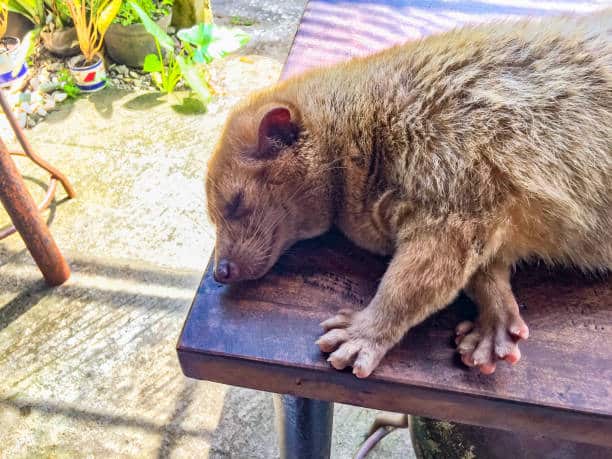
Description of the Luwak
The Asian Palm Civet, locally known as the Luwak in Indonesia, plays a central role in the creation of Kopi Luwak. This small, nocturnal mammal, resembling a cat-like creature with a long snout and a bushy tail, is native to South and Southeast Asia. The Luwak is known for its arboreal lifestyle, predominantly spending its time in the trees. Its coat is grayish in color with a unique pattern of dark markings on its body, providing camouflage in the dense forest canopy.
Civets are omnivorous, feeding on a variety of fruits, insects, and small mammals. However, their part in the story of Kopi Luwak comes from their particular fondness for ripe coffee cherries. The Luwak’s ability to select the best and ripest coffee cherries makes it an unwitting but critical participant in the production of this unique coffee.
Its Role in the Production of Kopi Luwak Coffee
The involvement of the Luwak in producing Kopi Luwak Coffee is both natural and indispensable. In their nightly forays, civets consume ripe coffee cherries for their fleshy pulp. The beans inside these cherries, however, are not digested. Instead, they pass through the civet’s digestive system, undergoing a series of natural fermentation processes.
As the beans travel through the civet’s intestines, enzymes and gastric juices interact with them, altering their chemical structure. This process reduces the beans’ bitterness and imparts a distinctive flavor profile that is not replicable through artificial means. Once excreted by the civet, these beans are collected, thoroughly cleaned, sun-dried, and lightly roasted to preserve their unique characteristics.
The role of the Luwak in this process is so pivotal that without it, there would be no Kopi Luwak. This natural fermentation process, courtesy of the civet’s digestive system, is what sets this coffee apart and is the secret behind its smooth, rich, and less acidic taste. As a result, the Luwak has become an integral part of the cultural and economic fabric of regions producing this unique coffee, linking the wild to the world of luxury coffee in an inextricable bond.
The Journey of a Kopi Luwak Bean
From Civet to Cup
The production process of Kopi Luwak coffee is as unique as the coffee itself, involving several distinct stages from the initial consumption of coffee cherries by civets to the final brewed cup of coffee. Let’s delve into this fascinating journey.
Civets Consuming Coffee Cherries
- The journey begins in the plantations and forests where coffee cherries grow. The Asian Palm Civet plays a key role here. It roams freely at night, using its keen sense of smell to select and consume the ripest and most succulent coffee cherries.
- The civets are selective eaters, which means only the best cherries are chosen, ensuring a high-quality starting point for the coffee beans.
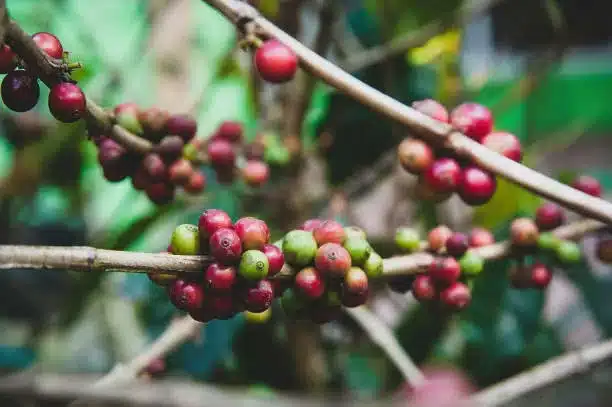
Natural Fermentation in the Civet’s Stomach
- Once ingested, the coffee cherries travel through the civet’s digestive system. The pulp of the cherry is digested, but the beans inside remain intact.
- During digestion, the beans undergo a natural fermentation process. Enzymatic reactions occur, altering the proteins and sugars in the beans. This reduces their bitterness and enhances their flavor.
- This fermentation process is unique to Kopi Luwak and cannot be replicated artificially. It’s the secret to the coffee’s distinctive taste.
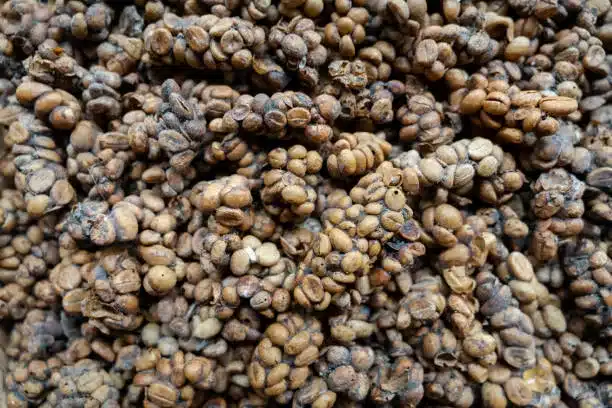
Collection and Cleaning of Beans
- After the beans are excreted by the civets, they are collected by farmers. This task requires a keen eye and careful handling.
- The collected beans are thoroughly washed and cleaned to ensure all remnants of the civet’s digestive process are removed.
- The beans are then sun-dried, a crucial step in developing their flavor profile. This drying process must be carefully monitored to prevent spoilage and to achieve the ideal moisture content in the beans.
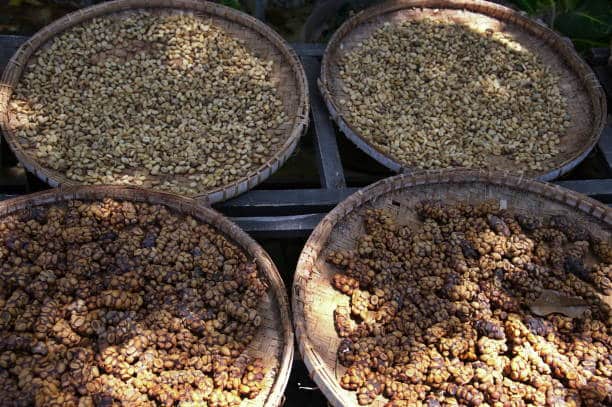
The Roasting and Brewing Process
- The cleaned and dried beans are roasted, a delicate and skillful process that brings out the rich flavors and aromas of Kopi Luwak coffee. The roasting is typically light too medium, ensuring the unique flavors aren’t overshadowed by the roast.
- Once roasted, the beans are ready to be ground and brewed. The brewing of Kopi Luwak is an art in itself. The goal is to highlight its unique characteristics—smooth body, low acidity, and complex flavor notes.
- Whether prepared in an espresso machine, a French press, or a simple drip brewer, the brewing process should be executed with precision to ensure the perfect cup of Kopi Luwak coffee, a brew that is not just a coffee but a testament to a remarkable natural process.
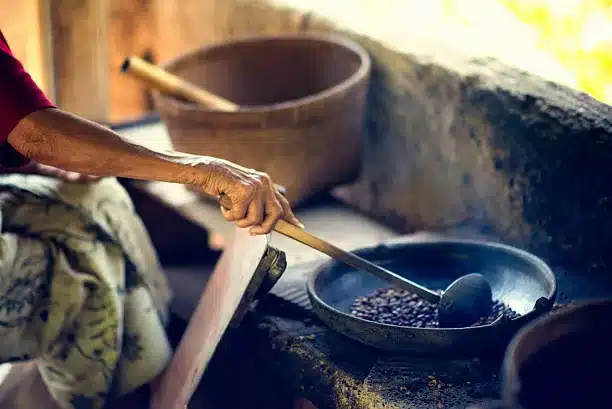
From the nocturnal foraging of the civet to the careful roasting and brewing, each step in the journey of a Kopi Luwak bean adds to its story, culminating in a cup of coffee that is truly like no other. This journey, so deeply intertwined with the rhythms of nature and human craftsmanship, is what makes Kopi Luwak coffee not just a rare delicacy but a symbol of the extraordinary intersections of the natural and culinary worlds.
The Taste Test
Flavor Profile
Description of the Aroma, Acidity, Body, and Flavor Notes
- Aroma: Kopi Luwak coffee is renowned for its complex and aromatic profile. It often exudes rich, earthy notes combined with hints of caramel and chocolate. Some varieties may also have a slight fruity undertone, reminiscent of the cherries the civets consume.
- Acidity: One of the most remarkable features of Kopi Luwak coffee is its low acidity. The natural fermentation process in the civet’s stomach breaks down the beans’ acids, resulting in a smoother, milder acidity compared to regular coffees. This makes it particularly appealing to those who find other coffees too harsh on the stomach.
- Body: Kopi Luwak typically has a full, velvety body. It coats the palate smoothly, offering a luxurious mouthfeel that balances well with its flavor complexity.
- Flavor Notes: The flavor profile of Kopi Luwak is distinct and varied. Common tasting notes include a blend of nutty, chocolaty, and spicy elements, with a subtle background of ripe fruit. The finish is often long and lingering, leaving a pleasant aftertaste that invites another sip.
Comparison with Other Premium Coffees
- When compared to other high-end coffees like Jamaican Blue Mountain or Ethiopian Yirgacheffe, Kopi Luwak stands out for its unique production process and resulting flavor profile. While Jamaican Blue Mountain is known for its mild flavor and lack of bitterness, and Ethiopian Yirgacheffe is celebrated for its floral and fruity notes, Kopi Luwak brings a different kind of complexity to the table. Its smoothness and rich, nuanced flavors, devoid of the usual bitterness, make it a unique experience in the coffee world.
- Unlike other premium coffees, which owe their characteristics primarily to their growing conditions and processing methods, Kopi Luwak coffee’s unique taste is largely a result of the natural fermentation it undergoes in the civet’s digestive system. This not only imparts a distinct flavor profile but also ensures that each batch of Kopi Luwak can offer a slightly different tasting experience, depending on the specific diet of the civets and the coffee cherries they consume.
In conclusion, while Kopi Luwak coffee shares the stage with other premium coffees, it dances to its own tune. Its combination of rich aroma, low acidity, full body, and complex flavor notes, all born from its unique journey through nature, make it a standout choice for coffee enthusiasts looking to explore beyond the conventional and experience a truly unique brew.
related article – is specialty coffee worth the extra cost?
Good day, fellow coffee enthusiasts! Do you find yourself mindlessly sipping on your instant coffee every morning, wondering what it would be like to taste something that’s not reminiscent of burnt rubber? Well, have no fear because we’re here to tell you that there is hope. Read Our Full Article Here.

Why So Expensive?
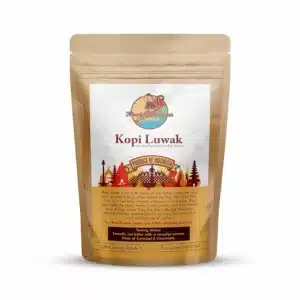
Kopi Luwak’s status as one of the most expensive coffees in the world isn’t just a matter of marketing or prestige. There are concrete reasons behind its high price tag, primarily rooted in its rarity and the intricate, labor-intensive production process. Additionally, the role of demand in a market that prizes unique and exotic offerings also plays a significant part in its pricing.
Rarity and Labor-Intensive Production
- Rarity: The production of Kopi Luwak is naturally limited. The civets are selective in their consumption, and the process cannot be rushed or artificially replicated without compromising the quality. This selectiveness, combined with the dependence on the natural habits of wild animals, greatly limits the amount of Kopi Luwak that can be produced annually.
- Labor-Intensive Process: Every step in the production of Kopi Luwak requires meticulous care and manual labor. From tracking and collecting the civet’s droppings in the wild to the detailed cleaning and processing of the beans, each stage is labor-intensive. This hands-on approach, essential to maintaining the authenticity and quality of Kopi Luwak, adds to the overall cost of production. The careful roasting and packaging processes, often done in small batches, further contribute to the high price.
The Role of Demand in Pricing
- Exclusivity Appeal: Kopi Luwak coffee has gained a reputation as a luxury item, often sought after by connoisseurs and enthusiasts who are willing to pay a premium for its unique attributes. This exclusivity appeal adds to its high demand in certain circles.
- Marketing and Perceived Value: The story and uniqueness of Kopi Luwak make it not just a coffee but an experience, a novelty. This aspect is often highlighted in marketing efforts, enhancing its perceived value. Consumers are not just buying a coffee; they’re purchasing a piece of an exotic narrative, a rarity in the coffee world.
- Global Demand: While its origins are in Indonesia, Kopi Luwak has garnered international interest. This global demand, coupled with its limited supply, naturally drives up its price. Specialty coffee shops, high-end restaurants, and luxury hotels often feature Kopi Luwak on their menus, catering to a clientele that seeks exclusive experiences.
In summary, the high cost of Kopi Luwak coffee is a direct reflection of its rare and labor-intensive production process, as well as the market demand for exclusive, luxury products. It’s a coffee that transcends the usual parameters of pricing, driven by its unique story, limited availability, and the extraordinary experience it offers to the consumer.
Ethical Considerations
Controversy and Criticism
Kopi Luwak, while celebrated for its unique production and flavor, has not been without its share of controversy and criticism, particularly regarding the ethical treatment of civets and the sustainability of its production.
Ethical Issues Surrounding Civet Treatment
- Captive Civets and Welfare Concerns: The rising demand for Kopi Luwak coffee led to the establishment of civet ‘farms’ where civets are often kept in captivity under substandard conditions. This practice has raised significant animal welfare concerns. Captive civets are sometimes kept in cramped, unsanitary cages and fed a diet limited to coffee cherries, which is not nutritionally adequate for their omnivorous needs.
- Impact on Wild Civet Populations: The allure of Kopi Luwak coffee has also led to the trapping of wild civets. This not only disrupts their natural living patterns but also threatens their population in the wild.
- Authenticity vs. Animal Welfare: There’s an ongoing debate about the authenticity of Kopi Luwak coffee produced from caged civets versus the ethical implications of such practices. The original process, which involved wild civets, is deemed more authentic but less controllable and scalable.
Sustainable and Cruelty-Free Alternatives
- Certification and Regulation: In response to these ethical concerns, some producers have started adopting more humane practices. Certifications like UTZ Certified and Rainforest Alliance are being sought by producers to assure consumers of ethical practices. These certifications aim to ensure that the civets are treated humanely and that the coffee production is environmentally sustainable.
- Synthetic Fermentation Processes: Innovations in biotechnology have led to the development of synthetic fermentation processes that mimic the natural enzymatic reactions occurring in civets’ stomachs. This alternative seeks to replicate the taste of Kopi Luwak without involving civets, thereby eliminating the ethical concerns.
- Educating Consumers: Part of addressing the controversy involves educating consumers about the ethical implications of their choices. Increasing awareness about the plight of civets and the impact of certain production practices can steer demand towards more ethical, sustainable options.
- Supporting Ethical Producers: For those who wish to enjoy Kopi Luwak coffee without contributing to animal cruelty, supporting small-scale producers who ensure the ethical treatment of civets and follow sustainable practices is crucial. These producers often allow civets to roam freely and collect beans from their natural droppings, ensuring both the welfare of the civets and the authenticity of the coffee.
The controversy surrounding Kopi Luwak coffee serves as a reminder of the complexities and responsibilities inherent in the production and consumption of luxury goods. It highlights the need for a balanced approach that respects animal welfare and sustainability, while still appreciating the unique qualities of this exceptional coffee.
related article – master making a good cuppa at home
Today, we will show you how to make a good cup of coffee at home that will rival any coffee shop brew. Are you tired of mediocre coffee that just doesn’t hit the spot? Are you tired of shelling out your hard-earned cash for a cup of Joe that leaves you wanting more? Well, fear … Read More >>

Certification and Authenticity
Given the ethical concerns and the premium nature of Kopi Luwak, it’s crucial for consumers to be able to identify authentic, ethically sourced Kopi Luwak. Ensuring authenticity not only guarantees the unique taste experience but also supports ethical and sustainable production practices.
Identifying Authentic Kopi Luwak Coffee
- Traceability and Transparency: Genuine Kopi Luwak producers often provide detailed traceability, showcasing the journey from the coffee plantation to the final product. This transparency is key in ensuring authenticity.
- Physical Characteristics of Beans: Authentic Kopi Luwak beans have certain unique characteristics. They are typically more irregular in shape and size, and have a slightly smoother surface due to the natural fermentation process in the civet’s digestive system.
- Taste and Aroma: Authentic Kopi Luwak should have a rich aroma and a distinct flavor profile characterized by a lack of bitterness, smoothness, and complex notes. However, this requires a discerning palate familiar with different coffee profiles.
Certifications for Ethical Sourcing
- Specialty Certifications: Look for specialty certifications that indicate ethical sourcing and humane treatment of civets. Certifications like UTZ, Rainforest Alliance, or similar can be indicators of ethical practices.
- CAGE-FREE or WILD-HARVESTED Labels: Some producers label their Kopi Luwak as ‘cage-free’ or ‘wild-harvested’. This suggests that the civets are not kept in captivity for the production of the coffee.
- Direct Trade Relationships: Some roasters and brands maintain direct trade relationships with growers and producers. These relationships can provide more direct oversight and assurance of ethical practices.
Supporting Ethical and Sustainable Practices
- Educate Yourself and Ask Questions: As a consumer, educating yourself about Kopi Luwak and asking vendors specific questions about sourcing and production can help in making informed decisions.
- Avoid Suspiciously Low Prices: Authentic, ethically sourced Kopi Luwak is typically expensive due to its rare and labor-intensive production process. Suspiciously low prices can be a red flag for inauthentic or unethically produced coffee.
- Check Online Reviews and Recommendations: Researching and reading reviews from coffee enthusiasts and experts can provide insights into reputable brands and sources for authentic Kopi Luwak.
In summary, identifying authentic, ethically sourced Kopi Luwak coffee involves a combination of understanding the product’s physical characteristics, seeking specialty certifications, and being an informed and questioning consumer. By choosing authentic and ethically sourced Kopi Luwak, consumers can enjoy this unique coffee experience while supporting responsible and sustainable practices.
Kopi Luwak in Popular Culture
From Hollywood to High-End Cafes
Kopi Luwak’s journey into the limelight extends beyond the realm of coffee connoisseurs and into popular culture and high society. Its exotic origin and unique production process have made it a symbol of luxury and exclusivity, capturing the imagination of audiences and consumers worldwide.
References in Movies, TV Shows, and Media
- Hollywood’s Fascination: Kopi Luwak has made notable appearances in various movies and TV shows, often portrayed as the epitome of luxury and exotic taste. For instance, its mention in the film “The Bucket List” starring Jack Nicholson and Morgan Freeman brought it into mainstream discussions.
- Documentaries and Special Features: Numerous documentaries and lifestyle shows have featured Kopi Luwak coffee, exploring its unique production process and the ethical concerns associated with it. These features have played a significant role in both educating the public and adding to the mystique of this rare coffee.
- Media Coverage: Regular coverage in food and lifestyle magazines, as well as online platforms, keeps Kopi Luwak coffee in the public eye. From articles detailing its luxurious nature to debates about its ethical implications, Kopi Luwak continues to be a topic of interest in various media outlets.
Its Status Symbol in Society
- Synonymous with Luxury and Exclusivity: Kopi Luwak’s high price and rarity have made it a symbol of affluence and exclusivity. It’s often sought after by those looking to experience the finest and most unique products available.
- High-End Cafes and Gourmet Restaurants: Kopi Luwak has found its way into the menus of high-end cafes and gourmet restaurants around the world. Serving Kopi Luwak is a way for these establishments to offer an exclusive experience to their patrons.
- Gifts and Specialty Items: Packaged in elegant containers and often presented as high-value gifts, Kopi Luwak has become a popular luxury item for those seeking to impress with a unique and lavish gift.
- Social and Cultural Impact: The popularity of Kopi Luwak has also led to discussions about sustainable and ethical consumption. Its status as a luxury item is often juxtaposed with the ethical concerns surrounding its production, leading to a broader discourse on responsible luxury.
In essence, Kopi Luwak’s presence in popular culture and high society goes beyond its taste and rarity. It has become a symbol of a lifestyle, a conversation starter about luxury, ethics, and the choices we make as consumers in a globalized world. From the silver screen to the sophisticated settings of high-end eateries, Kopi Luwak coffee continues to fascinate and provoke, remaining a unique emblem of luxury in the world of coffee and beyond.
related article – the best coffee grinder for every budget
If you want to take your coffee game to the next level, it’s time to invest in the best coffee grinder. Ah, coffee. The magical elixir that turns morning grumps into bright-eyed and bushy-tailed humans ready to take on the day. But let’s face it, the quality of your coffee depends heavily on the tools … Read Our Full Article Here

Brewing the Perfect Cup of Kopi Luwak Coffee
Tips and Techniques
When it comes to enjoying Kopi Luwak, the brewing method and pairing choices can significantly enhance the experience. Here are some recommendations for brewing methods and pairing suggestions to fully savor the unique qualities of this rare coffee.
Recommendations for Brewing Methods
- French Press: The French press is an excellent choice for brewing Kopi Luwak coffee. Its gentle pressure allows the full flavor and oils of the coffee to be extracted without over-extraction, which can highlight the unique profile of Kopi Luwak.
- Pour-Over: For a cleaner and more nuanced cup, the pour-over method is ideal. It offers control over the extraction process, allowing the intricate flavors of Kopi Luwak to shine through.
- AeroPress: The AeroPress is suitable for those who prefer a richer, more concentrated cup. It combines immersion and pressure for a unique extraction, emphasizing the deep and complex flavors of Kopi Luwak.
- Espresso Machine: If you enjoy a more robust brew, using an espresso machine can intensify the distinct characteristics of Kopi Luwak. However, it’s important to use a gentle pressure and avoid over-extracting to maintain the coffee’s natural smoothness.
- Grinding: Use a burr grinder for a consistent grind. A medium grind works well for most brewing methods, but you can adjust according to your preferred method.
- Water Quality and Temperature: Use filtered water at a temperature just below boiling (around 195°F to 205°F) to avoid burning the coffee, which can mask its unique flavors.
I have used a French Press (along with many other brewing methods) for years and absolutely love the taste it produces. If you have always thought of trying a brew from a French Press but are still not sure, then check out “The Ultimate Guide To French Presses (25 Of Your French Press Questions Answered)” It may just be the push you needed!

Pairing Suggestions
- Desserts: Pair Kopi Luwak with desserts that have caramel, chocolate, or nutty flavors. The smoothness of the coffee complements the sweetness and richness of desserts like chocolate truffles, caramel cheesecake, or almond biscotti.
- Cheese: For a savory pairing, choose mild to medium cheeses such as Brie or Gouda. Their creamy texture and subtle flavors can balance the complexity of Kopi Luwak without overpowering it.
- Fruit: Serve Kopi Luwak with fruits like berries or figs. Their natural sweetness and slight acidity can enhance the fruity undertones of the coffee.
- Breakfast Foods: Kopi Luwak pairs well with breakfast items like buttery croissants, oatmeal with brown sugar and nuts, or a classic eggs Benedict. The coffee’s smoothness and rich flavor profile make it a versatile companion for various breakfast dishes.
- Spiced Dishes: Try Kopi Luwak with lightly spiced dishes such as cinnamon rolls or ginger cookies. The subtle spices can interact interestingly with the coffee’s own spicy notes.
Remember, the key to enjoying Kopi Luwak coffee is to treat it as an experience, not just a beverage. Take the time to savor its aroma and flavors, and experiment with different pairings to discover how they can complement and enhance this unique coffee.
Where to Find Kopi Luwak
Sourcing the Beans
Finding authentic Kopi Luwak is crucial to ensure you’re experiencing the genuine taste and supporting ethical practices. Here are some tips on where to buy authentic Kopi Luwak, considering both online and local vendors.
Tips on Where to Buy Authentic Kopi Luwak
- Specialty Coffee Shops: High-end coffee shops, especially those specializing in exotic or international coffees, are more likely to carry authentic Kopi Luwak coffee. These shops often have direct relationships with producers and can provide detailed information about the coffee’s origin and production.
- Reputable Online Retailers: There are numerous online retailers that specialize in rare and exotic coffees, including Kopi Luwak. Look for retailers with good reviews, transparent sourcing information, and ideally, those that offer certifications or proof of ethical sourcing.
- Direct from Plantations or Producers: Some plantations in Indonesia and Southeast Asia sell Kopi Luwak coffee directly to consumers. Buying directly from the source can sometimes ensure authenticity and also supports the local coffee-growing community.
- Gourmet Food Stores: Upscale food stores or sections within larger retail outlets sometimes carry Kopi Luwak. These stores often curate their products carefully, which can be a sign of authenticity.
Online vs. Local Vendors
- Online Vendors:
- Pros: Greater selection, ability to research and verify authenticity through reviews and product information, and convenient delivery options.
- Cons: Risk of misrepresentation, inability to physically inspect the product before purchase, and potential for longer shipping times which might affect freshness.
- Local Vendors:
- Pros: Ability to speak directly with knowledgeable staff, inspect the product in person, and support local businesses.
- Cons: Limited selection, potentially higher prices due to overhead costs, and the need to verify the authenticity and ethical sourcing on your own.
Key Considerations
- Certifications and Ethical Sourcing: Regardless of where you buy it, ensure the Kopi Luwak comes with certifications for ethical sourcing. This not only guarantees the coffee’s authenticity but also ensures that it was produced in a humane and sustainable manner.
- Price as an Indicator: Authentic Kopi Luwak is expensive due to its rare and labor-intensive production process. Be wary of prices that seem too good to be true.
- Ask Questions: Whether buying online or from a local vendor, don’t hesitate to ask questions about the coffee’s origin, production process, and ethical practices. A reputable seller should be transparent and willing to provide this information.
In conclusion, sourcing authentic Kopi Luwak requires some research and due diligence, whether you choose to buy online or from a local vendor. Ensuring authenticity and ethical production is key to enjoying this unique coffee in a responsible and informed manner.
Kopi Luwak Coffee: Beyond the Cup
Impact on Local Economies
The production of Kopi Luwak has a significant impact on local economies, particularly in regions where it is harvested and processed. Understanding this impact provides insight into the broader implications of this unique coffee beyond its taste and rarity.
Economic Benefits
- Job Creation: The production of Kopi Luwak creates jobs in local communities. From the gathering and processing of the coffee beans to their packaging and distribution, each step provides employment opportunities.
- Source of Income for Farmers: For coffee farmers in regions where Kopi Luwak is produced, it can be a lucrative source of income. Given its high market value, farmers can earn substantially more from selling Kopi Luwak beans than regular coffee beans.
- Boost to Tourism: In some areas, the fame of Kopi Luwak coffee has boosted tourism. Coffee plantations offer tours and tastings, attracting tourists eager to learn about and experience this unique coffee first-hand.
Social Impact
- Community Development: The revenue generated from Kopi Luwak production can lead to community development. This includes improved infrastructure, education, and healthcare services in rural coffee-producing regions.
- Cultural Significance: In places like Indonesia, the production of Kopi Luwak coffee is intertwined with local culture and traditions. It’s a source of pride and cultural identity for many communities.
Challenges and Concerns
- Dependence on a Single Commodity: Over-reliance on Kopi Luwak for economic prosperity can be risky. Fluctuations in market demand or price can significantly impact local economies.
- Ethical and Environmental Concerns: There’s growing concern about the ethical treatment of civets and the environmental impact of Kopi Luwak production. In some cases, the demand for Kopi Luwak has led to unsustainable practices, such as the capture and caging of wild civets.
- Need for Sustainable Practices: There’s an increasing emphasis on implementing sustainable and ethical practices in Kopi Luwak production. This includes ensuring the humane treatment of civets and adopting environmentally friendly farming practices.
The Way Forward
- Promoting Ethical Production: Supporting and promoting ethically produced Kopi Luwak can help mitigate negative impacts while maintaining economic benefits. This involves encouraging practices that prioritize animal welfare and environmental sustainability.
- Diversification: Encouraging diversification in local economies can reduce the risks associated with dependence on Kopi Luwak. This might include developing other agricultural products or alternative sources of income.
In summary, the production of Kopi Luwak has a multifaceted impact on local economies. While it can bring economic benefits and contribute to community development, it also presents challenges that need to be addressed responsibly. Balancing economic gains with ethical and sustainable practices is crucial for the long-term wellbeing of the communities involved in the production of this unique coffee.
Kopi Luwak Coffee FAQ’s
Q. How Much is Kopi Luwak Coffee in Bali?
In Bali, the price of Kopi Luwak coffee varies depending on its purity and whether it is authentically produced. The range can be quite broad:
- Price Range: Kopi Luwak coffee prices range from about 100 to 600 USD per kilo. This variation depends on whether the coffee is pure or mixed with other types1.
- Price for Pure Kopi Luwak: For pure Kopi Luwak, the average price is around 600 USD per kilo. However, authentically produced Kopi Luwak, which adheres to traditional and ethical production methods, can cost as much as 3,000 USD per kilo1.
- Cost Variation in Bali: In Bali, the price of Kopi Luwak also depends on the quality of the coffee and its selling location. It can cost anywhere from 200,000 to 500,000 Indonesian Rupiah, which is approximately 14 to 35 USD (based on current exchange rates)2.
- Lower Grade Options: There are also farmed Kopi Luwak coffee options available, which are considered to be of lower grade. These can be purchased for about 100 USD per kilo in large grocery stores in Indonesia3.
The wide range in pricing reflects the diversity in quality and authenticity of Kopi Luwak available in Bali, from mass-produced, lower-grade options to premium, authentically produced varieties.
Q. How Much is Kopi Luwak Coffee in Australia?
In Australia, the price of Kopi Luwak coffee varies significantly based on whether it is farmed or wild-collected, as well as the quality and the seller. Here’s a detailed breakdown of the costs:
- Price Per Cup: A single cup of Kopi Luwak coffee in Australia can range from $35 to $100. This range likely reflects the difference between farmed and wild-collected Kopi Luwak, with the latter being more expensive due to its rarity and the more labor-intensive process of collection1.
- Price By Weight: When it comes to purchasing Kopi Luwak by weight, the prices are as follows:
The price variations highlight the significant difference in value between farmed and wild-collected Kopi Luwak, with the wild variety being notably more expensive. This difference is attributed to the ethical and labor concerns associated with wild-collected Kopi Luwak, as well as its perceived superior quality due to the natural foraging habits of the civets in the wild. Additionally, the higher cost for a single cup of the wild variety reflects its status as a luxury item and the unique experience it offers.
Q. Is Kopi Luwak Coffee Worth It?
Determining whether Kopi Luwak coffee is “worth it” depends on several factors and is largely subjective, varying from person to person based on individual values, tastes, and interests. Here are some considerations to help you decide:
- Flavor and Experience: Kopi Luwak is known for its unique flavor profile, often described as less bitter, smoother, and more complex than regular coffee. If you are a coffee aficionado interested in exploring rare and exotic flavors, trying Kopi Luwak could be a worthwhile experience.
- Cost: Kopi Luwak is one of the most expensive coffees in the world. Its high price is due to its rarity and the labor-intensive process of production. For some, the unique experience justifies the cost, while for others, the price may not correlate with a significantly different or better taste compared to other premium coffees.
- Ethical Considerations: There are ethical concerns related to the production of Kopi Luwak, particularly regarding the treatment of civets and sustainable practices. Ethically sourced, wild Kopi Luwak (as opposed to beans from caged civets) is often more expensive but addresses some of these concerns. If animal welfare and ethical production are important to you, this will be a significant factor in determining its worth.
- Personal Values and Curiosity: Your personal values and level of curiosity also play a role. If trying unique and luxurious products aligns with your interests, you might find Kopi Luwak worth the expense. Conversely, if you prioritize other attributes in coffee (like sustainability or a specific flavor profile), you might not find it as appealing.
- Comparative Quality: Some coffee experts argue that the taste of Kopi Luwak coffee is not significantly superior to other high-quality specialty coffees, which can be purchased at a fraction of the cost. If your interest is in quality and taste rather than the novelty, you might find better value exploring other premium coffee options.
In summary, whether Kopi Luwak is worth it depends on your personal taste, interest in unique coffee experiences, ethical considerations, and willingness to pay a premium price. It’s a personal choice that varies based on individual priorities and interests in the world of coffee.
Kopi Luwak Conclusion
Kopi Luwak, often hailed as the most exclusive coffee in the world, captivates with its unique production process and distinctive taste. This coffee’s journey, from being consumed and then naturally processed by the Asian Palm Civet, imparts a flavor that’s less bitter, smoother, and more nuanced than traditional coffee. This rarity and the labor-intensive process of gathering and preparing the beans contribute to its status as one of the most expensive coffees available.
However, Kopi Luwak’s coffee allure is not without controversy. Ethical concerns regarding the treatment of civets, especially in farms where they may be kept in suboptimal conditions, pose significant questions. The impact on wild civet populations and the environment adds layers to this debate. Authenticity and ethical sourcing become crucial considerations for potential buyers.
For those intrigued by Kopi Luwak, it’s an invitation to explore a unique facet of the coffee world. If you’re considering delving into the experience of Kopi Luwak, do so with an informed perspective. Understand the ethical implications, the difference between wild and farmed beans, and the importance of supporting sustainable and humane practices. This way, your foray into the world of Kopi Luwak not only satisfies curiosity but also aligns with a conscious and responsible approach to coffee enjoyment.
In the end, Kopi Luwak offers more than just a cup of coffee; it presents a complex narrative of luxury, tradition, and ethical considerations. Whether you choose to try it or not, Kopi Luwak undeniably adds a fascinating chapter to the rich and diverse story of coffee.
Kopi Luwak At Just Another Cuppa Coffee
Have you ventured into the intriguing world of Kopi Luwak Coffee? At Just Another Cuppa Coffee, we’re always curious to hear about your experiences with this extraordinary brew. Whether it’s your first sip or you’re a seasoned connoisseur of this rare delicacy, we invite you to share your stories and opinions. How did Kopi Luwak tantalize your taste buds? Did it live up to its reputation? Or perhaps, you have insights on the ethical dimensions of its production?
Your experiences, thoughts, and dialogues enrich our coffee community, offering diverse perspectives on this unique coffee. Join the conversation and become part of a broader discourse that’s about more than just coffee—it’s about culture, taste, and the choices we make in our pursuit of the perfect cup.
If you’re as passionate about coffee as we are, consider subscribing to Just Another Cuppa Coffee. Our content is a treasure trove for coffee lovers, brimming with insights, reviews, and the latest trends in the world of coffee. Stay tuned for more engaging content, and let us take you on a journey through the vast and vibrant universe of coffee.
And here’s something for Kopi Luwak enthusiasts: We’re excited to offer great deals on Kopi Luwak coffee directly from Just Another Cuppa Coffee. Sourced responsibly and ethically, our Kopi Luwak is an experience you wouldn’t want to miss. Check out our selection and indulge in the luxurious, complex flavors of one of the world’s most exclusive coffees.
Happy brewing and savoring from all of us at Just Another Cuppa Coffee!
In a family of coffee addicts, Mark started to appreciate the drink fairly late – around 35 years old.
His love for java began when he wrote articles on it and bought his first machine after which everything else just fell into place; there are now five machines in our home!
We start every day with an early morning cuppa coffee because what could better help set your mind right than some freshly brewed hot Coffee?
When Marks not writing or thinking about coffee, he can be found sipping on a cup of black gold at one of his favorite local joints.


